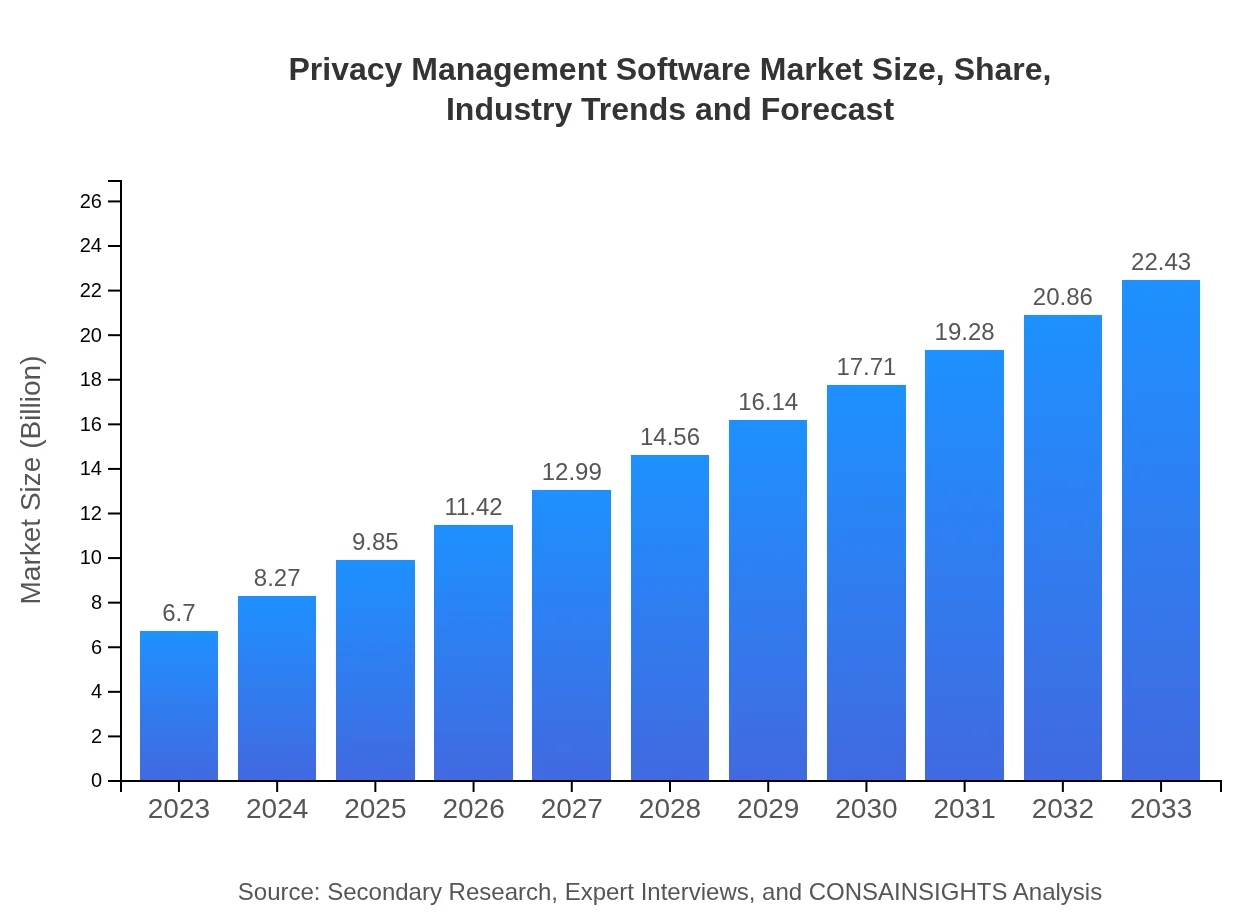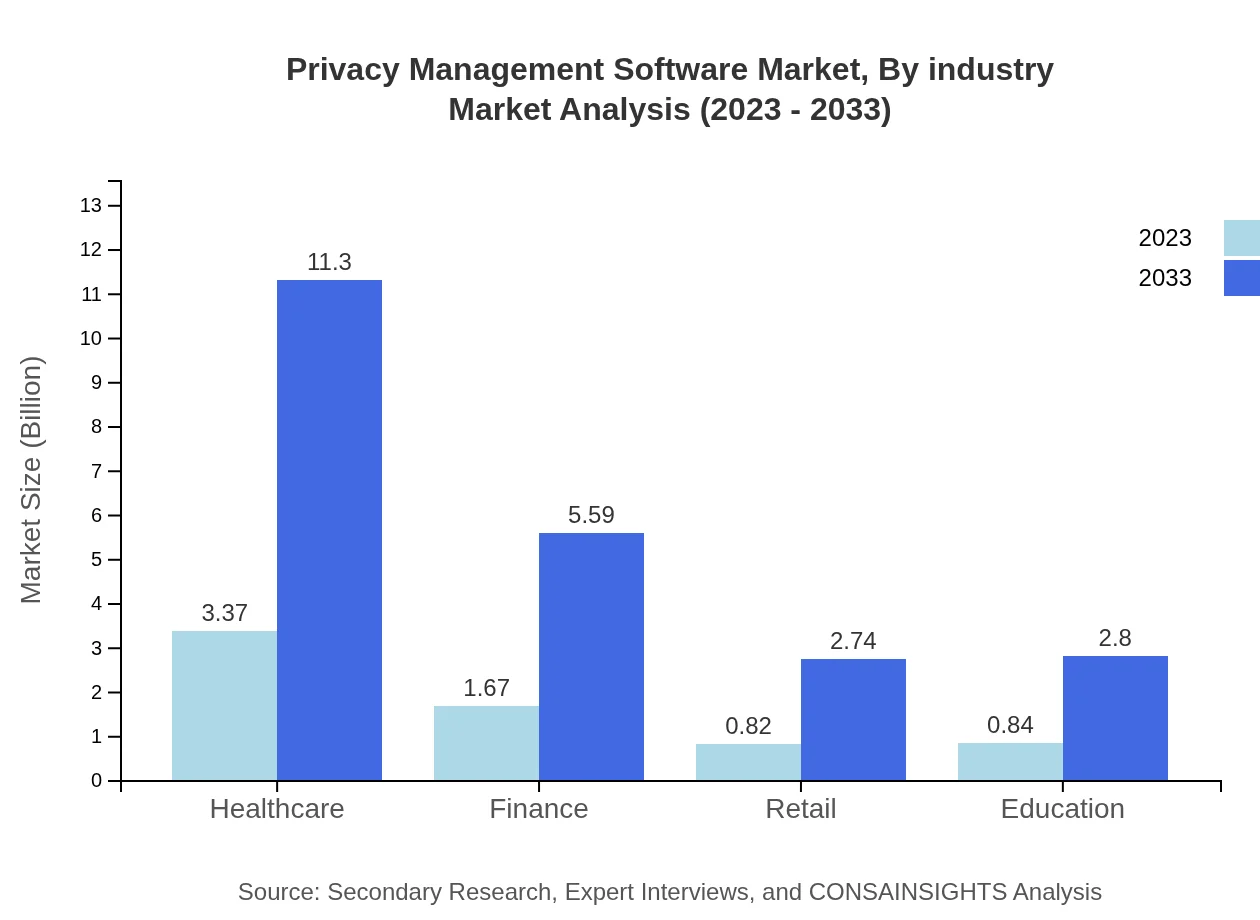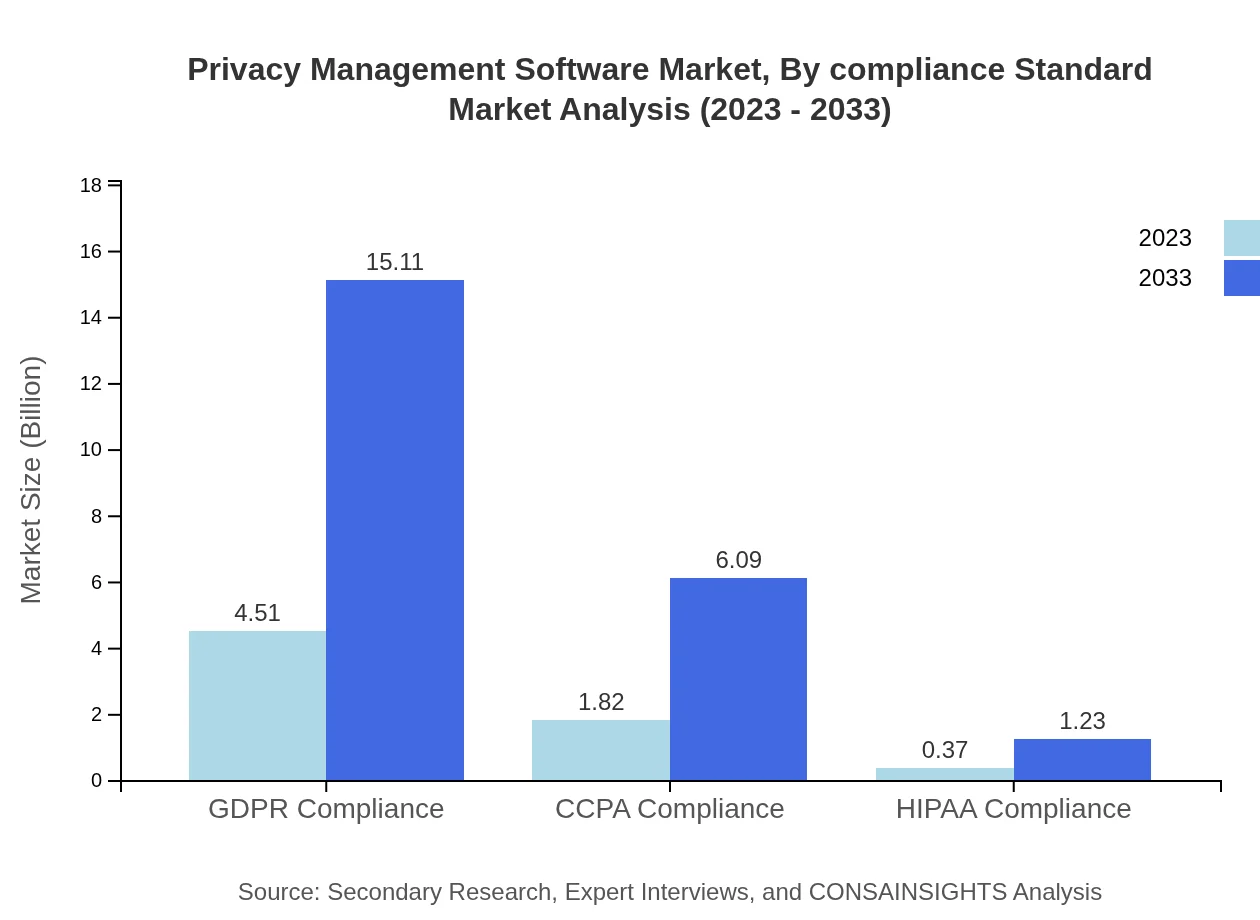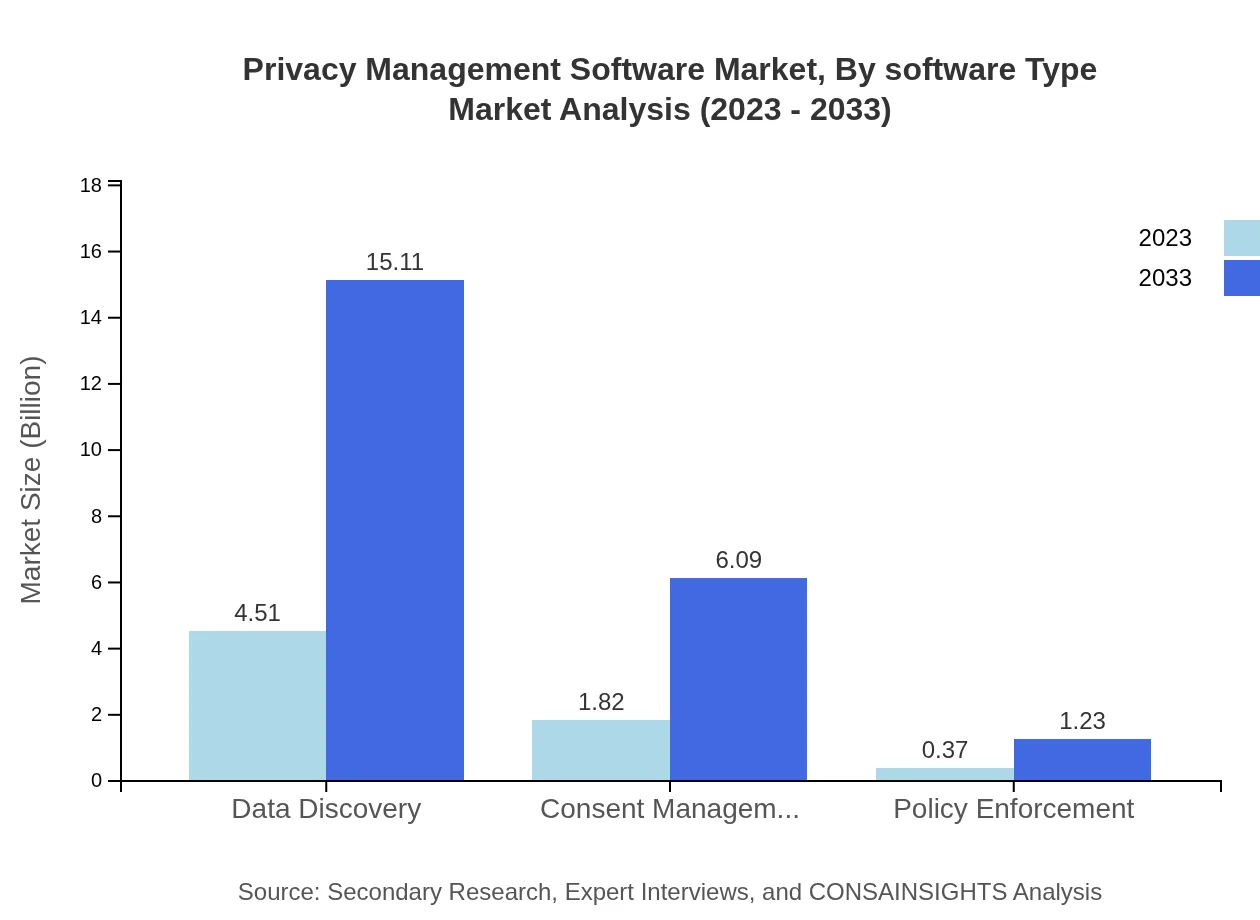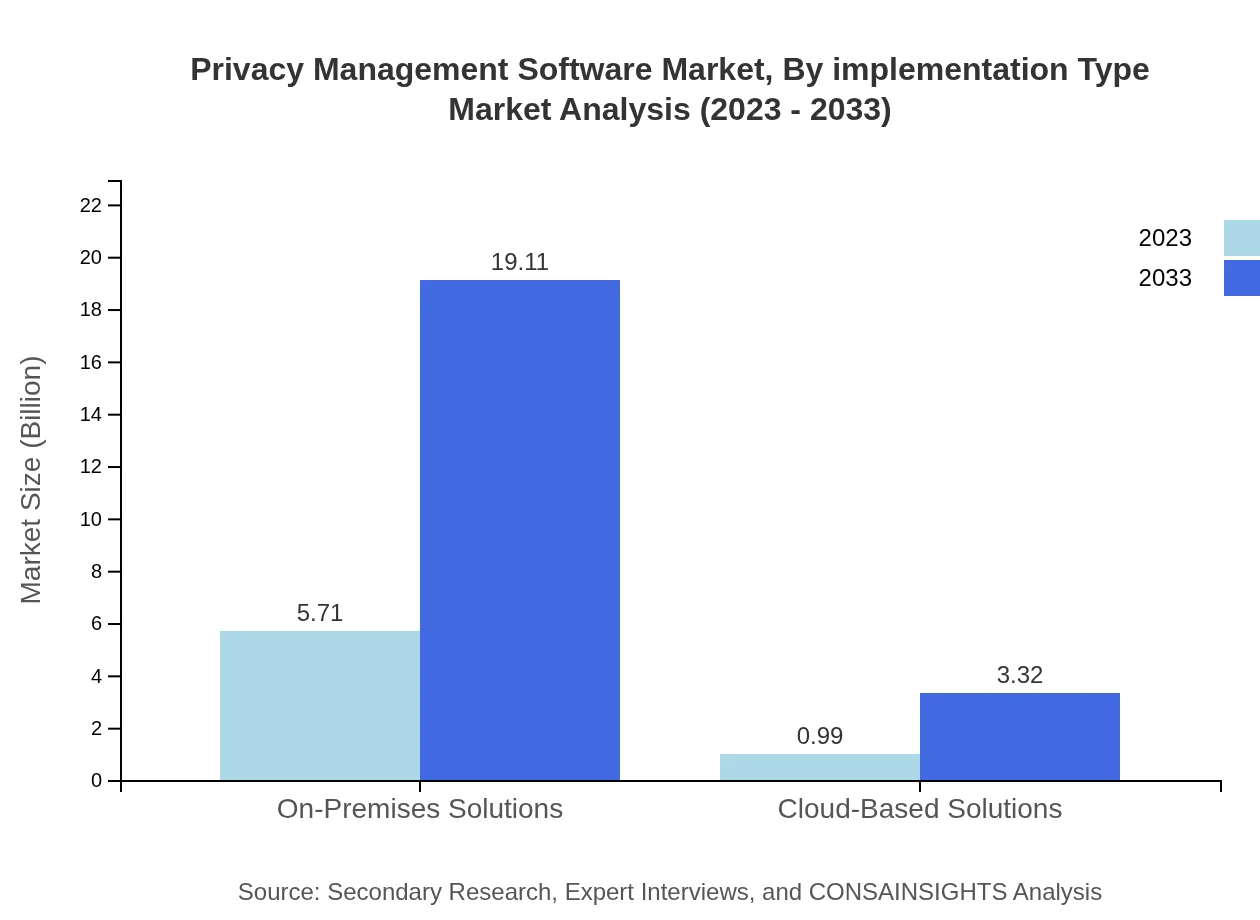Privacy Management Software Market Report
Published Date: 31 January 2026 | Report Code: privacy-management-software
Privacy Management Software Market Size, Share, Industry Trends and Forecast to 2033
This report provides a comprehensive analysis of the Privacy Management Software market from 2023 to 2033, offering insights into market dynamics, regional performance, technology trends, and key players shaping the industry landscape.
| Metric | Value |
|---|---|
| Study Period | 2023 - 2033 |
| 2023 Market Size | $6.70 Billion |
| CAGR (2023-2033) | 12.3% |
| 2033 Market Size | $22.43 Billion |
| Top Companies | OneTrust, TrustArc, BigID, SAP |
| Last Modified Date | 31 January 2026 |
Privacy Management Software Market Overview
Customize Privacy Management Software Market Report market research report
- ✔ Get in-depth analysis of Privacy Management Software market size, growth, and forecasts.
- ✔ Understand Privacy Management Software's regional dynamics and industry-specific trends.
- ✔ Identify potential applications, end-user demand, and growth segments in Privacy Management Software
What is the Market Size & CAGR of Privacy Management Software market in 2023?
Privacy Management Software Industry Analysis
Privacy Management Software Market Segmentation and Scope
Tell us your focus area and get a customized research report.
Privacy Management Software Market Analysis Report by Region
Europe Privacy Management Software Market Report:
Europe is anticipated to grow substantially, with the Privacy Management Software market projected to soar from $2.33 billion in 2023 to $7.80 billion by 2033. The stringent enforcement of GDPR and similar laws across EU member states prompts organizations to invest in comprehensive privacy solutions.Asia Pacific Privacy Management Software Market Report:
In the Asia Pacific region, the Privacy Management Software market is expected to grow from $1.22 billion in 2023 to $4.08 billion by 2033, driven by increasing internet penetration and awareness regarding data privacy issues. Countries like Japan, Australia, and India are leading the charge, with enterprises focusing on compliance as a competitive advantage.North America Privacy Management Software Market Report:
North America, particularly the United States, is the largest market for Privacy Management Software, with a value of $2.23 billion in 2023 projected to increase to $7.46 billion by 2033. The presence of major software companies and stringent regulatory frameworks significantly drive this market segment, causing firms to prioritize privacy management.South America Privacy Management Software Market Report:
The South American market is currently valued at $0.41 billion in 2023 and is projected to reach $1.39 billion by 2033. This growth is fueled by regulations gaining traction, along with rising digital transformation initiatives in Brazil and Argentina. Organizations here are gradually adapting to global privacy standards.Middle East & Africa Privacy Management Software Market Report:
The Middle East and Africa's Privacy Management Software market is currently at $0.51 billion (2023) and is expected to grow to $1.70 billion (2033), bolstered by increasing data protection regulations and shifting enterprise focus towards data privacy.Tell us your focus area and get a customized research report.
Privacy Management Software Market Analysis By Industry
The Healthcare segment is projected to grow from $3.37 billion in 2023 to $11.30 billion by 2033, continuing to dominate the Privacy Management Software market with a share of 50.37% throughout the forecast period. The Finance industry follows with a market size increasing from $1.67 billion to $5.59 billion, retaining a 24.92% market share. Retail and Education also show significant growth with forecasts of $0.82 billion to $2.74 billion and $0.84 billion to $2.80 billion respectively, each maintaining 12.22% and 12.49% market shares.
Privacy Management Software Market Analysis By Compliance Standard
The GDPR Compliance segment leads with a substantial market size of $4.51 billion in 2023, expected to grow to $15.11 billion by 2033. This compliance standard occupies a significant share of 67.38%. The CCPA Compliance segment also showcases notable growth from $1.82 billion to $6.09 billion, holding a 27.15% market share throughout this period. Other notable compliance standards include HIPAA, accounting for smaller yet critical shares within the broader market landscape.
Privacy Management Software Market Analysis By Software Type
Data Discovery is a key segment in the market, expected to grow from $4.51 billion to $15.11 billion, representing 67.38% of the total share. Consent Management and Policy Enforcement are also significant segments, growing from $1.82 billion and $0.37 billion respectively in 2023 to $6.09 billion and $1.23 billion by 2033.
Privacy Management Software Market Analysis By Implementation Type
The On-Premises Solutions market is valued at $5.71 billion in 2023 and is anticipated to reach $19.11 billion by 2033, holding a commanding 85.19% market share. In contrast, Cloud-Based Solutions are garnering attention, escalating from $0.99 billion to $3.32 billion, albeit with a smaller share of 14.81%.
Privacy Management Software Market Trends and Future Forecast
Tell us your focus area and get a customized research report.
Global Market Leaders and Top Companies in Privacy Management Software Industry
OneTrust:
OneTrust is a leading provider of privacy management software, specializing in compliance automation and data privacy programs. Its comprehensive solutions cater to a range of industries, ensuring organizations can achieve and maintain compliance with privacy regulations.TrustArc:
TrustArc offers a suite of privacy management solutions designed to help companies comply with various global privacy regulations. It provides assessments, compliance tools, and data protection insights to enhance data privacy strategies.BigID:
BigID employs advanced data discovery and intelligence capabilities to help organizations manage and protect personal data. Its solutions enable firms to comply with privacy regulations efficiently while safeguarding customer information.SAP:
SAP provides integrated privacy management tools within its broader enterprise software solutions. It supports organizations in maintaining governance over data, ensuring compliance with privacy standards, and enhancing data security postures.We're grateful to work with incredible clients.









FAQs
What is the market size of privacy Management Software?
The global privacy management software market is valued at $6.7 billion in 2023 and is projected to grow at a CAGR of 12.3%, indicating strong demand and expansion in the industry through 2033.
What are the key market players or companies in this privacy Management Software industry?
Key players in the privacy management software industry include established firms such as OneTrust, TrustArc, and BigID, which are recognized for their innovative solutions and compliance management offerings.
What are the primary factors driving the growth in the privacy Management Software industry?
Growth drivers for the privacy management software market include increasing regulatory scrutiny, rising data privacy concerns, and a surge in data breaches, prompting organizations to invest in compliance solutions.
Which region is the fastest Growing in the privacy Management Software?
Among the regions, Europe is the fastest-growing market for privacy management software, expanding from $2.33 billion in 2023 to $7.80 billion by 2033, fueled by stringent data protection regulations.
Does ConsaInsights provide customized market report data for the privacy Management Software industry?
Yes, ConsaInsights offers customized market report data tailored to specific needs within the privacy management software industry, ensuring clients receive relevant and actionable insights.
What deliverables can I expect from this privacy Management Software market research project?
Expect comprehensive deliverables including detailed reports, market analysis, competitive landscape information, and actionable recommendations based on the latest data and industry insights.
What are the market trends of privacy Management Software?
Current trends in the privacy management software market include increased adoption of cloud-based solutions, emphasis on user consent management, and rising investment in GDPR and CCPA compliance tools.

